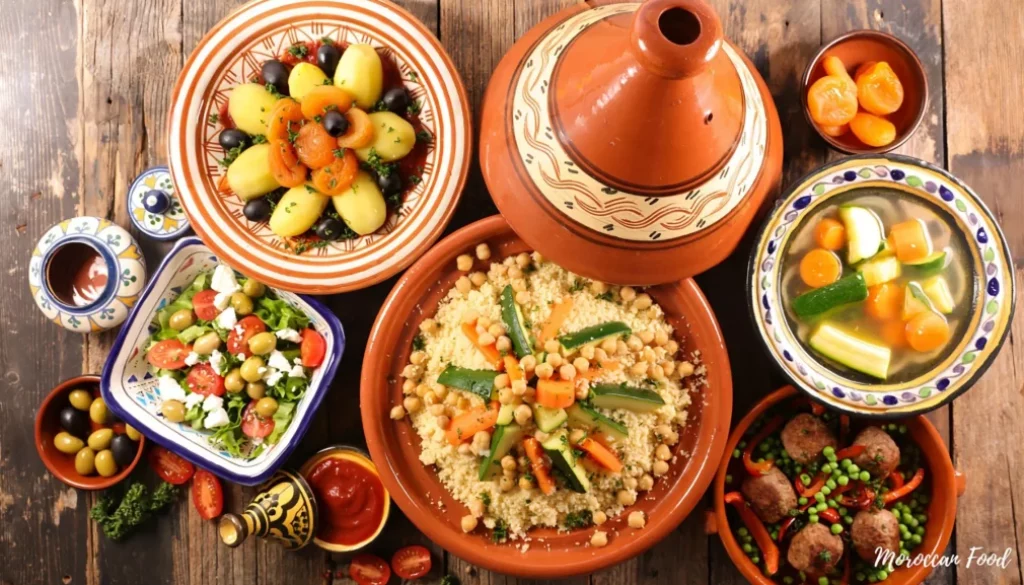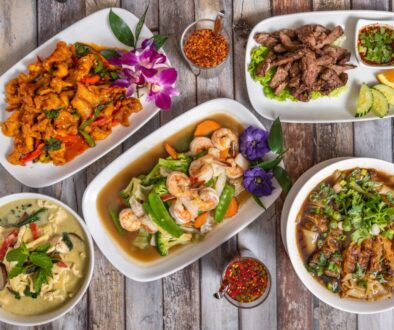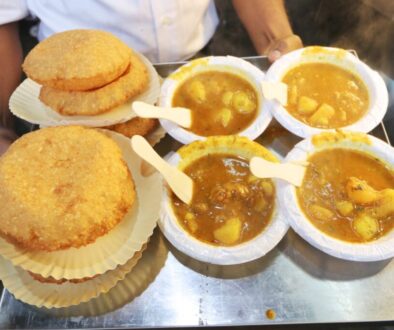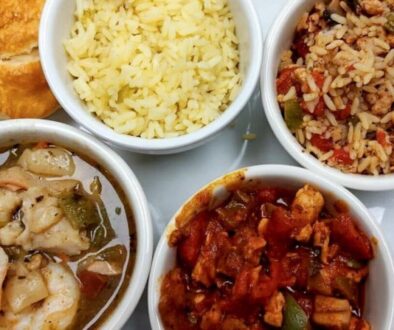Flavors of Marrakech: Exploring Moroccan Cuisine and Spices
Marrakech, an enchanting city in Morocco, is a hub of vibrant food culture that showcases the rich heritage and diverse flavors of Moroccan cuisine. From aromatic spice blends to mouthwatering traditional dishes, Marrakech offers a sensory feast for food enthusiasts. In this article, we will take a culinary journey through the flavors of Marrakech, explore the intricacies of Moroccan cuisine, and delve into the captivating world of Moroccan spices.
Moroccan cuisine is a melting pot of influences, blending flavors from Arab, Berber, and French cultures into a unique culinary tapestry. The use of spices and herbs is a defining characteristic of Moroccan cuisine, as they add depth, complexity, and aroma to the dishes. Moroccan spices are known for their burst of flavors and are a key component in creating the distinct taste of Moroccan dishes.
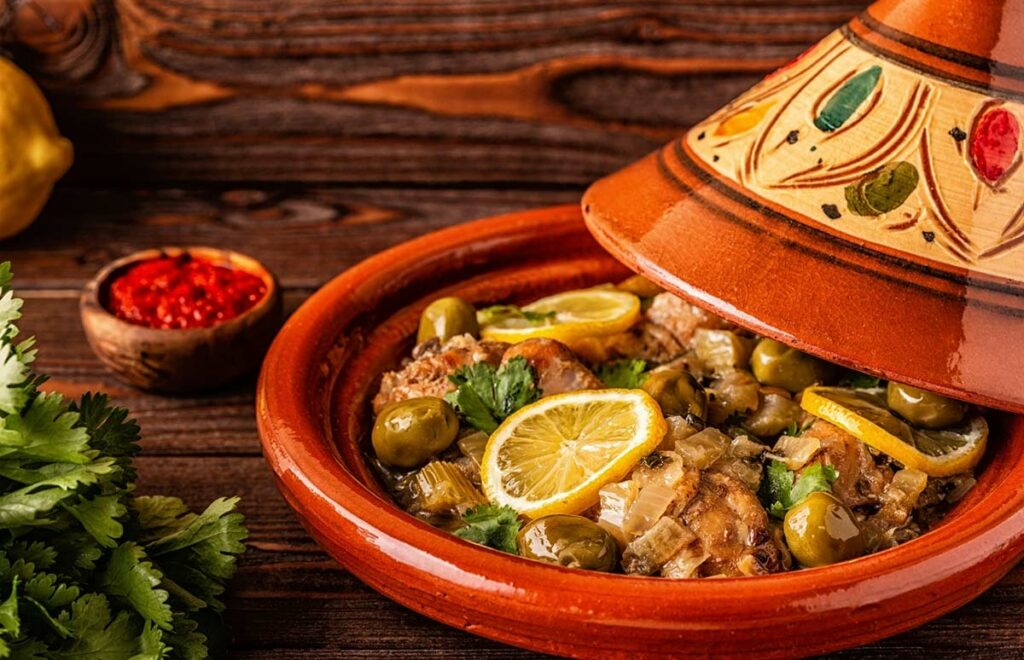
The Vibrant Food Culture of Marrakech
Marrakech, often referred to as the “Red City,” is a paradise for food lovers. The city’s bustling food markets, known as souks, are a treasure trove of fresh ingredients, aromatic spices, and delectable street food. Exploring the vibrant food culture of Marrakech is an adventure that will awaken your taste buds and leave you craving more.
Traditional Moroccan Dishes
Couscous: A Staple of Moroccan Cuisine
Couscous, a grain dish made from semolina, is the cornerstone of Moroccan cuisine. It is traditionally steamed and served with flavorful stews, known as tagines, creating a harmonious combination of textures and tastes.
Tagine: A Flavorful One-Pot Wonder
Tagine is a slow-cooked stew that takes its name from the conical earthenware pot in which it is cooked. This dish tantalizes the senses with tender meat, aromatic spices, and a medley of vegetables, resulting in a rich and flavorful experience.
B’stilla: A Savory Pastry Delight
B’stilla is a unique Moroccan dish that exemplifies the fusion of sweet and savory flavors. It features layers of flaky pastry filled with spiced pigeon or chicken, almonds, and eggs. The combination of cinnamon, saffron, and powdered sugar adds a touch of sweetness, making it a delightful culinary creation.
Influences from Other Cultures
Arabic Influence on Moroccan Cuisine
Moroccan cuisine draws heavily from Arabian influences, evident in the use of spices, dates, and nuts. The concept of communal dining and sharing food is also a reflection of Arab hospitality.
Berber Influence on Moroccan Cuisine
The Berber people, the indigenous inhabitants of North Africa, have significantly influenced Moroccan cuisine. Traditional Berber dishes like tagine and couscous have become staples in Moroccan households, showcasing the Berber culinary heritage.
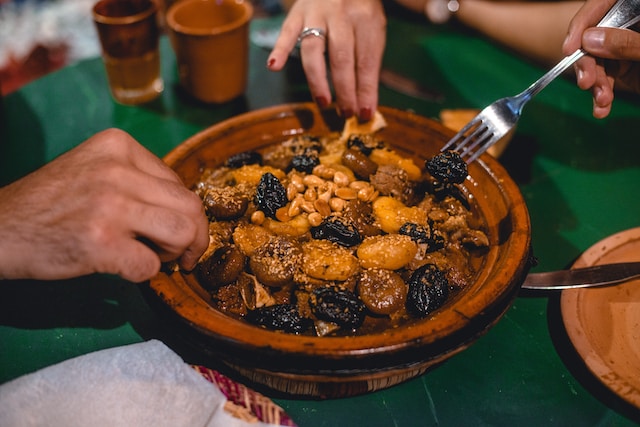
French Influence on Moroccan Cuisine
During the French colonial era, French cuisine left a profound impact on Moroccan cooking techniques. The introduction of pastries, bread, and wine has added a French flair to certain Moroccan dishes, further enriching the culinary landscape.
Wonders of Moroccan Spices
Understanding Moroccan Spice Blends
Moroccan cuisine is renowned for its intricate spice blends, such as Ras el Hanout and Baharat. These blends often consist of a variety of spices like cumin, coriander, paprika, and cinnamon, carefully combined to create a symphony of flavors.
Key Spices in Moroccan Cooking
Several spices play a pivotal role in Moroccan cooking, enhancing the taste and aroma of dishes. From the fiery heat of chili peppers to the earthy warmth of cumin, these key spices bring Moroccan cuisine to life.
Street Food Delights of Marrakech
Moroccan Doughnuts: Sfenj
Sfenj, a popular street food in Marrakech, are deep-fried doughnuts that are light, fluffy, and incredibly addictive. These golden treats are often sprinkled with sugar or dipped in honey, making them an irresistible indulgence.
Grilled Meat Skewers: Brochettes
Brochettes, or meat skewers, are a staple of Moroccan street food. The succulent pieces of meat, typically lamb or beef, are marinated in a blend of spices and then grilled to perfection. They are often enjoyed with bread and harissa, a fiery chili paste.
Moroccan Pancakes: Msemen
Msemen is a type of Moroccan pancake that is crispy on the outside and tender on the inside. These buttery delights are served with honey or jam, making them a popular choice for breakfast or a quick snack.
Teatime Traditions and Moroccan Sweets
Mint Tea: The Heart and Soul of Moroccan Hospitality
Mint tea, also known as Moroccan tea or Maghrebi mint tea, is an iconic part of Moroccan culture and hospitality. This refreshing and aromatic tea infused with fresh mint leaves is served ceremoniously, symbolizing friendship and warmth.
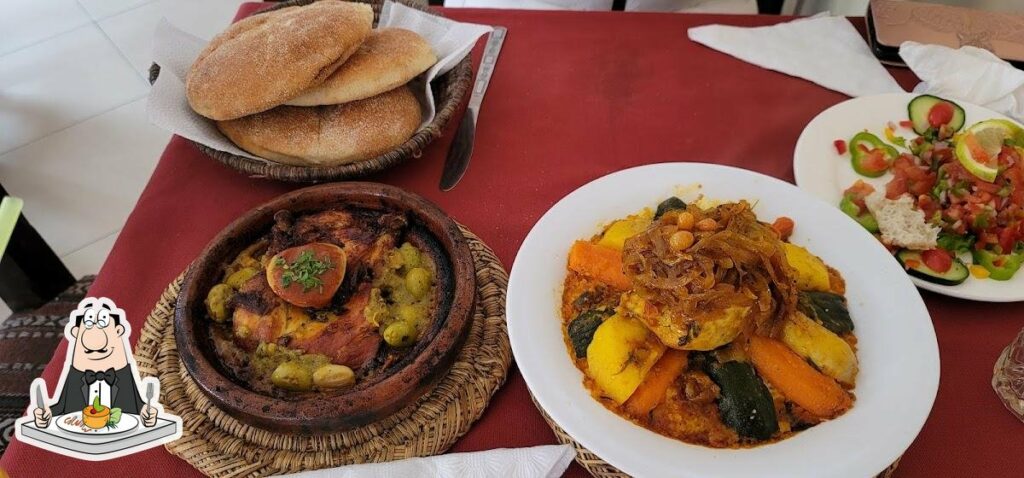
Moroccan Pastries: A Sweet Indulgence
Moroccan pastries, with their delicate layers and exquisite fillings, are a testament to the skill and craftsmanship of Moroccan bakers. From almond-filled crescents to honey-soaked pastries, these sweet treats never fail to delight the palate.
Gazelle Horns: Delicate Almond-Filled Treats
Gazelle horns, or cornes de gazelle, are almond-filled pastries shaped like crescent moons. These dainty delights are often dusted with powdered sugar and infused with hints of orange blossom water, resulting in a delightful combination of flavors.
The Magical Souks of Marrakech
Exploring Marrakech’s Spice Markets
No visit to Marrakech is complete without a trip to the vibrant spice markets. The air is filled with the intoxicating aroma of exotic spices like saffron, cumin, and turmeric. Strolling through the labyrinthine alleys, you’ll encounter stalls piled high with colorful spices, inviting you to embark on a sensory adventure.
Tips for Buying Moroccan Spices
When purchasing Moroccan spices, it’s important to know how to identify high-quality products. Look for vibrant colors, strong aromas, and reputable sellers who source their spices from reliable suppliers. Buying directly from local markets ensures an authentic experience and supports the local economy.
Experiencing Moroccan Cuisine and Spices Outside of Morocco
Moroccan Restaurants Around the World
For those unable to visit Marrakech, Moroccan restaurants around the world offer an opportunity to savor the flavors of Moroccan cuisine. From traditional tagines to exotic spice blends, these restaurants aim to recreate the magic of Moroccan food in every bite.
Cooking Moroccan Dishes at Home
Bringing the flavors of Marrakech into your own kitchen can be a rewarding experience. With readily available Moroccan spices and recipes, you can recreate authentic Moroccan dishes in the comfort of your home. Invite friends and family to indulge in the rich flavors and aromatic delights that make Moroccan cuisine so special.
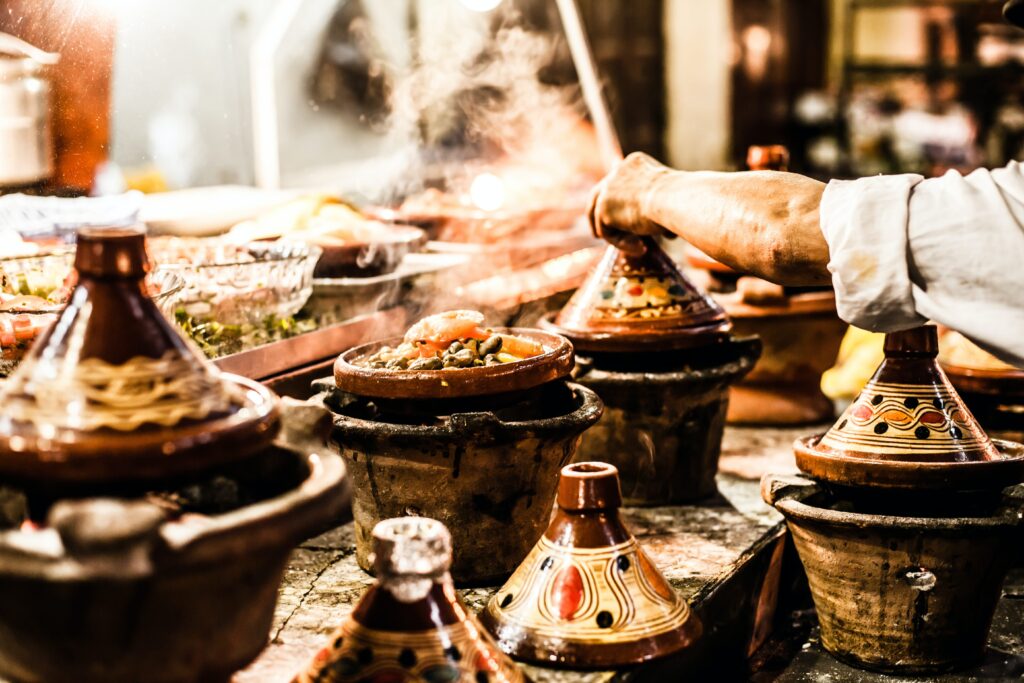
FAQs: Flavors of Marrakech
- Is Moroccan cuisine spicy?
Moroccan cuisine is known for its bold and flavorful spices, but it doesn’t necessarily mean that it is always spicy. While some dishes may have a hint of spice, others can be milder in flavor. The level of spiciness is often adjustable, allowing you to tailor it to your preference. - What are the typical ingredients used in Moroccan cooking?
Moroccan cooking incorporates a variety of ingredients to create its distinct flavors. Common ingredients include spices such as cumin, coriander, turmeric, paprika, and cinnamon. Fresh herbs like mint and cilantro are also widely used, along with staple foods like couscous, meat (particularly lamb and chicken), olive oil, preserved lemons, dried fruits, and nuts.
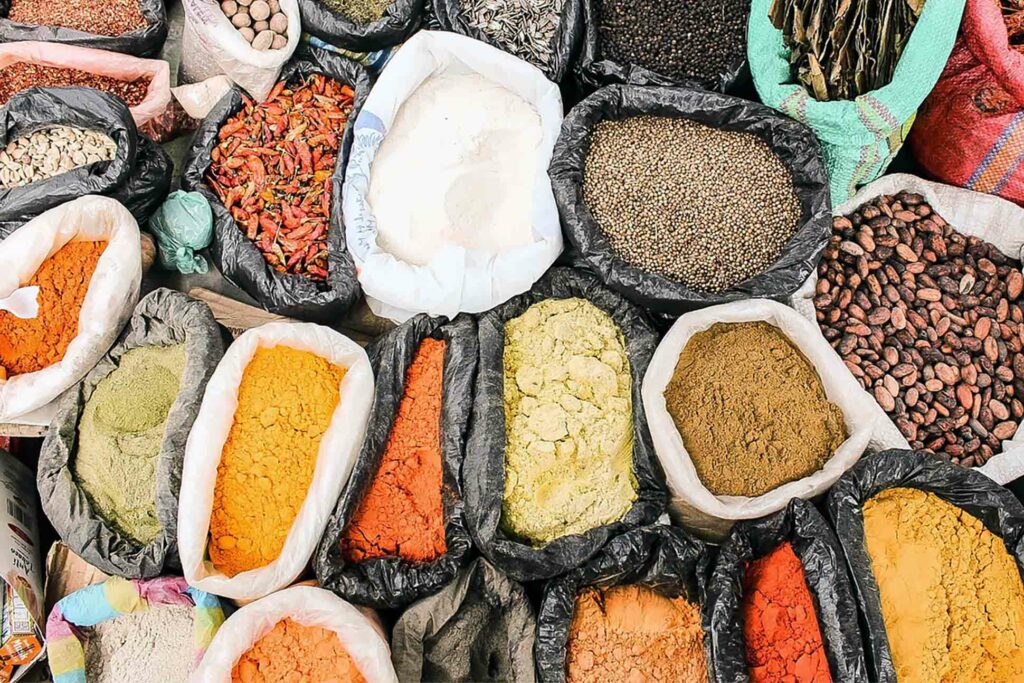
- Can I find Moroccan spices in local supermarkets?
While it depends on your location, most local supermarkets these days offer a wide range of international ingredients and spices, including Moroccan spices. However, for a more extensive and authentic selection, it’s recommended to visit specialty stores or ethnic markets that cater specifically to Moroccan or Middle Eastern cuisine. - Are there vegetarian options in Moroccan cuisine?
Absolutely! Moroccan cuisine is incredibly versatile and offers plenty of vegetarian options. Vegetable tagines, couscous dishes loaded with colorful vegetables, hearty lentil soups, and chickpea stews are just some examples of delicious vegetarian dishes you can enjoy. Moroccan cuisine celebrates the vibrant flavors of fresh produce, making it a paradise for vegetarians. - How can I experience the authentic flavors of Marrakech without visiting Morocco?
Although nothing beats the experience of tasting Moroccan flavors in Marrakech itself, you can still recreate the authentic taste at home. Start by sourcing high-quality Moroccan spices from specialty stores or online vendors. Experiment with traditional Moroccan recipes, such as tagines, couscous, and pastries. Attend cooking classes or workshops that specialize in Moroccan cuisine. And don’t forget to explore Moroccan restaurants in your area, as they often offer an authentic taste of Marrakech right in your own backyard.
Conclusion
In conclusion, the flavors of Marrakech offer a captivating experience for both the culinary explorer and the avid food lover. From the aromatic spice markets to the tantalizing street food, Moroccan cuisine is enticed with its vibrant flavors and rich cultural heritage. Delve into the world of Moroccan cuisine and spices, and let your taste buds embark on a journey they will never forget.
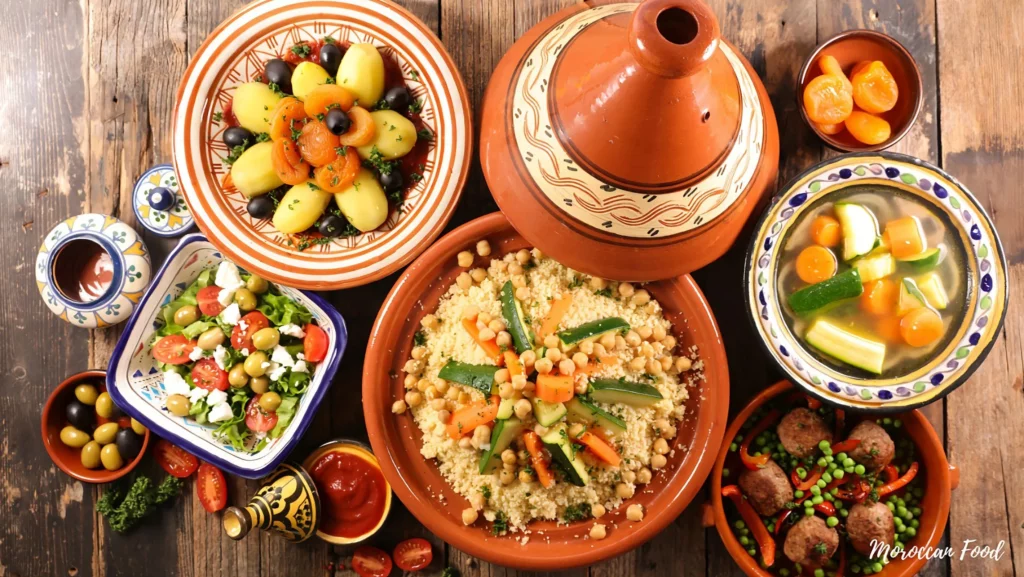
Also Read:
